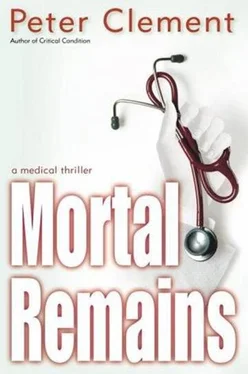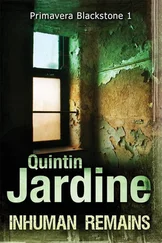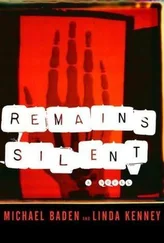Peter Clement - Mortal Remains
Здесь есть возможность читать онлайн «Peter Clement - Mortal Remains» весь текст электронной книги совершенно бесплатно (целиком полную версию без сокращений). В некоторых случаях можно слушать аудио, скачать через торрент в формате fb2 и присутствует краткое содержание. Жанр: Триллер, на английском языке. Описание произведения, (предисловие) а так же отзывы посетителей доступны на портале библиотеки ЛибКат.
- Название:Mortal Remains
- Автор:
- Жанр:
- Год:неизвестен
- ISBN:нет данных
- Рейтинг книги:3 / 5. Голосов: 1
-
Избранное:Добавить в избранное
- Отзывы:
-
Ваша оценка:
- 60
- 1
- 2
- 3
- 4
- 5
Mortal Remains: краткое содержание, описание и аннотация
Предлагаем к чтению аннотацию, описание, краткое содержание или предисловие (зависит от того, что написал сам автор книги «Mortal Remains»). Если вы не нашли необходимую информацию о книге — напишите в комментариях, мы постараемся отыскать её.
Mortal Remains — читать онлайн бесплатно полную книгу (весь текст) целиком
Ниже представлен текст книги, разбитый по страницам. Система сохранения места последней прочитанной страницы, позволяет с удобством читать онлайн бесплатно книгу «Mortal Remains», без необходимости каждый раз заново искать на чём Вы остановились. Поставьте закладку, и сможете в любой момент перейти на страницу, на которой закончили чтение.
Интервал:
Закладка:
“Could you excuse us a minute, nurse?”
Tanya nodded, then slipped out the door.
Earl closed it behind her. “You should have insisted they make it a priority, Dr. Roy.” He had no patience for that kind of passivity in his own department, and always taught his residents to stand up to it.
“Why-”
“Had she signed a do not resuscitate order?”
“No, but I figured-”
“Figured you were her last stop before she got to God, and she deserved your best shot at bringing her around.”
“But-”
“What was in the IV?”
“Two-thirds, one-third,” he answered, referring to a common intravenous mixture of sodium chloride and glucose.
“So even if she was hypoglycemic when she’d seized, you’d expect a normal level of glucose afterward, since you had been infusing her with it.”
Roy flushed some more. “Yes, I guess, except why would this patient be hypoglycemic in the first place? She didn’t have a history of diabetes, let alone diabetic medications.”
“Ever hear of a medication error?”
Roy went an even deeper shade of red.
“The point is,” Earl continued, “at the time of finding someone comatose, you can’t presume anything about how the person got that way, especially since they can’t tell you what happened. So you ‘do the DONT’ as we say, running through all the possibilities beginning with checking her serum glucose. And if you haven’t got a dextrose stick handy, you still can figure that a single rapid bolus of concentrated IV glucose never hurt anyone, even a diabetic.” Untreated, nerve cells die by the millions for every second hypoglycemia is allowed to persist, and the patient is at risk to seize, choke to death, or lose enough brain tissue to end up a living vegetable. Every first-year medical student knows this, so Earl saw no need to point it out to Roy. “It’s good you at least gave her some sugar,” he continued, “but it was too slow and too little, as far as being any therapeutic benefit to her. All you accomplished was to wipe out any evidence that her level had been low in the first place.” Any medical student would also know that if Dr. P. Roy had acted properly, Bessie McDonald might not be in her current state. No point to rubbing it in. This guy looked sunburned enough already, and no one could ever prove it. But that’s what he would have trouble living with, once he digested all the facts. He’d never be able to disprove it either.
“Hey, I did do an O 2sat, and it was fine just as it is now, and if she mistakenly got a narcotic overdose, her respirations would have been suppressed,” he said, beginning to sound more annoyed than defensive. “As for thiamine, she sure as hell hadn’t been malnourished or gone on a recent bender…”
Earl ignored whatever lame excuses the kid offered up – chances were good he wouldn’t screw up his next coma case – and refocused on what bothered him most about Bessie McDonald – her lack of focal signs. “What’s her level of consciousness today?” he asked, referring to a scoring system by which a patient’s response to verbal and painful stimuli was measured.
Roy looked taken aback, having built up a good head of indignation trying to justify himself and implying that an outsider who wasn’t on staff had no business berating him anyway. “Lousy,” he said after a few seconds, his face sullen. “She’s a three, exactly like the night we found her.”
A dead body would earn as much, just for being there.
“You ordered a CT scan?”
“What was the point? I thought I knew the diagnosis – a massive stroke – plus the lady was gorked.”
“Has your differential expanded any, after our discussion?”
He sighed heavily. Deflated, he seemed a shirt size smaller and an inch shorter, as did most kiddie-docs foolish enough to attempt a head-butt with a veteran rather than admit a mistake. “A CT will be done later today, sir,” he said, his unconditional capitulation made evident by the sudden disappearance of the word “but” from his vocabulary. “And an EEG.”
The former would visualize the extent of damage from a recent blood clot, if that was the cause. The latter, an electrical encephalogram, would pick up any remaining spark of electrical activity in the cortex of her brain, the stuff of walking and talking.
Earl asked Tanya to come back in the room. “You said she was found on the floor by the door?”
“Yes. We think she knew something wasn’t right and was trying to get help.”
“She didn’t use the call button?”
“They found it unplugged.”
“I think she must have pulled it out by accident when she reached for it,” Roy added.
Tanya’s brow arched, but she said nothing.
Earl followed her back toward the nursing station. “Anybody see Chaz Braden around here that night?”
She immediately slowed. “So you agree with me, that it’s possible he did this to her?” she whispered, once they were side by side.
“I agree only that it doesn’t look like a stroke, nothing more. For God’s sake, don’t go spouting crazy ideas.”
She gave him a “yeah, right” look.
“So did somebody see him?”
“No. I already checked. But that doesn’t mean he wasn’t on the floor. Coverage is minimal that shift, and he could easily have sneaked in.”
“Care to tell me now why you’re so down on him?”
“Why? My reasons have nothing to do with Bessie.”
“I want to know the extent of your beef with the man, and if that might cloud your judgment toward him.”
She walked a few steps farther without saying anything, then slowed her pace until they were walking alongside each other. “I worked in cardiac ICU before being transferred here. He’s a slimeball. Put his hands on me one night. I complained, and got transferred for my trouble. Not that I mind it here. I like old people. But my training is in critical care.”
He eyed the procession of elderly men and women tottering back and forth along the corridor and wondered how he’d feel if someone pulled him out of ER to plunk him down in their midst. “Quite a culture shock,” he said.
“But don’t think I’m fingering him just because I want to get even with the guy. I really liked Bessie. If someone did mess with her, all I’m after is to damn well make sure nobody just shuffles what happened here under the rug. They’re a little laissez-faire about relapses and death around this floor for my liking.”
Earl again sympathized. Geriatrics was a discipline of settling, becoming resigned to death; in critical care, however, as in ER, they defied it.
“There’s another person to whom she might have confided. Dr. Collins visited her that night.”
“Melanie?”
“Just a social call. Bessie wasn’t admitted under her this time. But she thought the world of Dr. Collins. Told me more than once how that woman’s fast action staved off her first stroke. She blamed her current doctors for not doing the same.”
“Why do you think she’d tell Melanie anything about Chaz?”
“Bessie had been in a mood to talk about him, and I don’t think she intended to be flattering. Since I didn’t have time to listen, maybe she bent Dr. Collins’s ear.”
Earl thanked her and took the elevator down to the ground floor where he slipped outside the Thirty-third Street entrance, determined to contact Melanie. In the harsh glare of winter sunlight, he joined the other cell phone users who restlessly circled and turned like pigeons flocked at the pedestal of a statue, their murmurings rising above the noisy morning traffic.
He had to settle on leaving her yet another message. Why wasn’t she answering her calls?
An attempt to reach Mark yielded the same out-of-order recording he’d gotten last night.
Читать дальшеИнтервал:
Закладка:
Похожие книги на «Mortal Remains»
Представляем Вашему вниманию похожие книги на «Mortal Remains» списком для выбора. Мы отобрали схожую по названию и смыслу литературу в надежде предоставить читателям больше вариантов отыскать новые, интересные, ещё непрочитанные произведения.
Обсуждение, отзывы о книге «Mortal Remains» и просто собственные мнения читателей. Оставьте ваши комментарии, напишите, что Вы думаете о произведении, его смысле или главных героях. Укажите что конкретно понравилось, а что нет, и почему Вы так считаете.












